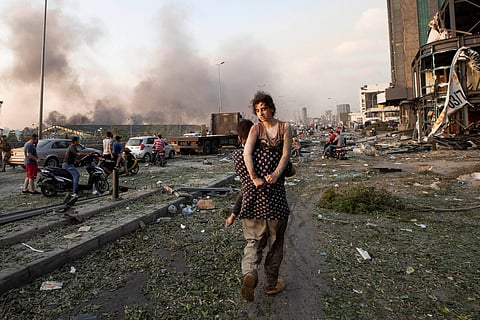

Beirut, Lebanon's capital, is waking up on Thursday to three consecutive days of national mourning after a major explosion ripped through a port on Tuesday, killing at least 135 people and injuring some 5,000 more. Several countries dispatched emergency aid to the country on Wednesday.
Qatar sent mobile hospitals, generators and burn sheets, while Algeria will send four planes and a ship with humanitarian aid, medical teams and firefighters. President of France Emmanuel Macron is set to visit Lebanon on Thursday, while the World Health Organization (WHO) has pledged to send trauma and surgical kits from Dubai.
Meanwhile, Germany has sent dozens of search and rescue specialists to find survivors trapped beneath rubble following the explosion.
Finding lodgings for people is also proving a challenge after the blast decimated a chunk of the city center. The governor of Beirut said that about 200,000 to 250,000 people have become homeless due to the explosion.
Lebanon's Prime Minister, Hassan Diab, has declared three days of mourning from Thursday. While the origin of the blast hasn't been unearthed, it is believed that the blast was caused by 2,750 tons of ammonium nitrate. According to local media, the explosion was sparked by welding material.
Diab condemned that ammonium nitrate was sitting at a port warehouse for more than half a decade.
Lebanon's cabinet has ordered house arrest for the port officials involved in storing or guarding the material in the warehouse.
"It is unacceptable that a shipment of 2,750 tons of ammonium nitrate has been present for six years in a warehouse, without taking preventive measures," Diab said at a defense council meeting, according to his spokesman later briefing reporters.
Chemist and broadcaster Andrea Sella told DW that early indications suggest the explosion was a result of regulation issues and complacency.
He also expressed shock at the negligence relating to the storage of ammonium nitrate, which was responsible for the blast after an initial fire. He said: "We know it has to be stored carefully. The idea that you had 3,000 tons of this stuff, which is really close to residential areas, just doesn't bare thinking about and it's an indication of an absolutely massive regulatory failure."
Wrangling between authorities also played a significant part in the chain of events that led to Tuesday's explosion, according to the chemical expert.
He said: "It appears in Beirut they got into a tangle between the legal authorities, the safety authorities, the port authorities, that just led to gridlock. There is a complacency here. Remember, when nothing happens we start to assume it'll be ok."
When asked by DW's Brent Goff if this could occur in another city elsewhere in the world the chemist said: "The history of ammonium nitrate tells us that thing happens regularly, again and again. Industrial accidents happen a lot. They happen due to complicated chains. It'll be very difficult to ascribe blame to one or another individual. There are clearly responsibilities all down the line and it will happen gain unfortunately."